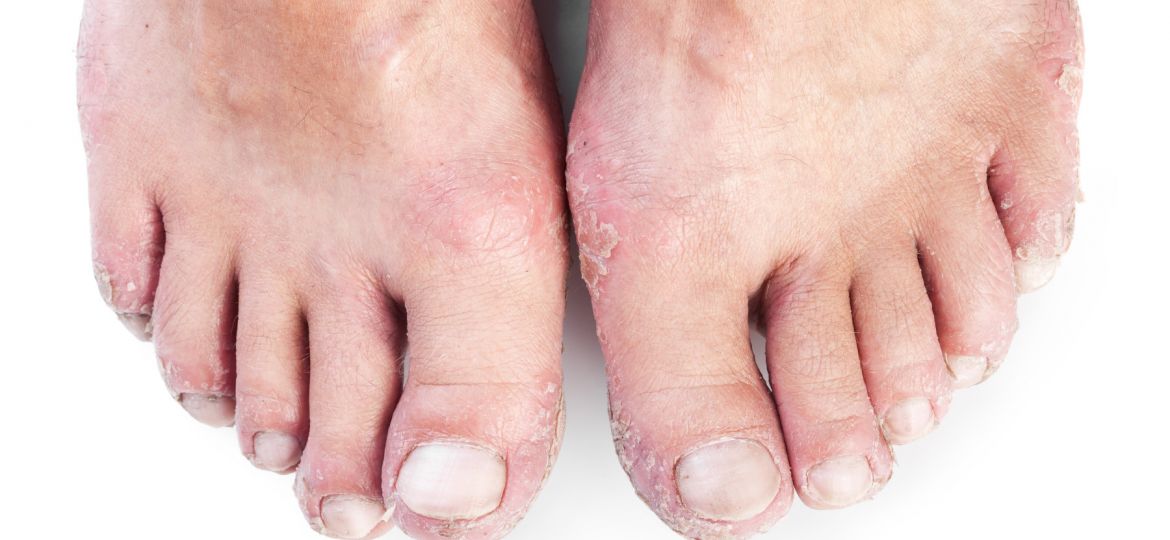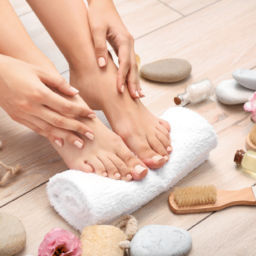
A common skin condition, it can affect any part of the body, including eczema on your feet and legs. In this blog, we dive into the intricacies of this condition exploring the causes, symptoms, and effective management strategies. Whether you’re dealing with persistent itchiness, redness, or flaking skin, this comprehensive guide aims to provide insights and solutions for finding relief and restoring skin health.
What Are The First Signs Of Eczema On Your Foot?
Identifying eczema on the feet involves recognizing the characteristic signs and symptoms of this skin condition. The first signs typically include:
- Itching: Persistent itching is one of the earliest and most common signs of eczema on the feet. The itching can be intense and may worsen at night, leading to discomfort and disturbed sleep.
- Redness: The affected skin may appear red or inflamed. This redness can be localized to specific areas or spread across larger portions of the feet, depending on the severity of the eczema flare-up.
- Dryness and Flaking: Eczema often causes dry, scaly patches on the skin. You may notice areas of dryness and flakiness on the foot, especially around the ankles, soles, or between the toes.
- Cracking and Peeling: As eczema progresses, the skin may become cracked or fissured. This can lead to peeling of the skin, particularly in areas of thickened skin or where the eczema is more severe.
- Blisters or Vesicles: In some cases, eczema can present as small fluid-filled blisters or vesicles. These blisters may rupture, leading to oozing and crusting of the affected skin.
- Thickened Skin (Lichenification): Chronic eczema can cause the skin to thicken and become leathery or rough in texture. This thickening, known as lichenification, is a result of prolonged inflammation and scratching.
- Pain and Discomfort: Eczema can cause discomfort, tenderness, or a burning sensation, especially if the skin is cracked or inflamed. Walking or wearing shoes may exacerbate these symptoms.
- Secondary Infections: In severe cases or if eczema is left untreated, the affected skin may become susceptible to bacterial or fungal infections. Signs of infection include increased redness, warmth, swelling, and pus-like drainage.
If you notice any of these signs or symptoms of eczema on your feet, it’s essential to consult a healthcare professional or dermatologist for an accurate diagnosis and appropriate treatment. Early intervention can help manage eczema effectively and prevent complications.
What Are The Causes Of Eczema On The Feet?
Eczema, also known as foot dermatitis or pedal eczema, can be caused by various factors, including genetic predisposition, environmental triggers, and lifestyle factors.
- Genetic Factors: A significant factor in developing eczema on the feet is genetic predisposition. Individuals with a family history of eczema, asthma, or allergic rhinitis are more likely to develop eczema themselves. Genetic variations can affect the skin’s barrier function and immune response, making it more susceptible to inflammation and allergic reactions.
- Environmental Triggers: Exposure to certain environmental factors can trigger or exacerbate eczema flare-ups on the foot. These triggers may include:
- Irritants: Harsh soaps, detergents, and chemicals in footwear or socks can irritate the skin, leading to eczema.
- Allergens: Allergens such as pollen, dust mites, pet dander, or certain fabrics can trigger allergic reactions on the feet.
- Climate: Dry, cold weather can cause skin dryness and worsen eczema symptoms, while hot and humid conditions can lead to sweat and friction, triggering flare-ups.
- Microbes: Bacterial or fungal infections, such as athlete’s foot, can contribute to eczema symptoms.
- Lifestyle Factors: Certain lifestyle habits and practices can also play a role in eczema development on the feet:
- Poor Hygiene: Inadequate foot hygiene, such as infrequent washing or improper drying can lead to bacterial or fungal growth and eczema symptoms.
- Stress: Emotional stress or anxiety can trigger inflammatory responses in the body, potentially exacerbating eczema symptoms.
- Clothing and Footwear: Wearing tight-fitting or non-breathable footwear, socks, or synthetic fabrics can trap moisture and irritants, leading to eczema flare-ups.
- Skin Barrier Dysfunction: Individuals with eczema often have impaired skin barrier function, which allows irritants, allergens, and microbes to penetrate the skin more easily. This compromised barrier function contributes to inflammation, itching, and eczema symptoms on the feet.
How Do You Treat Eczema On The Feet?
Eczema on the feet can be a challenging condition to manage due to the unique characteristics of the skin on the soles and the potential for constant friction and moisture exposure. Treatment strategies for foot eczema focus on restoring the skin barrier, managing symptoms, and preventing flare-ups.
- Identify and Avoid Triggers: Determine if the eczema is triggered by specific allergens or irritants. Common triggers for foot eczema include certain fabrics, detergents, soaps, and footwear materials.
- Skin Barrier Repair: Use gentle, fragrance-free moisturizers and emollients to hydrate and repair the skin barrier. Apply these products multiple times a day, especially after washing the feet, to lock in moisture and prevent dryness.
- Wash Your Hands: Regular hand washing is crucial, but use mild, non-irritating soaps and lukewarm water. Pat your hands dry gently to avoid further irritation.
- Topical Steroids: For acute flare-ups or severe symptoms, topical corticosteroids may be prescribed by a healthcare professional. These medications can help reduce inflammation and itching on the feet.
- Manage Dyshidrotic Eczema: Dyshidrotic eczema, characterized by tiny blisters on the palms, fingers, and soles of the feet, may require specific treatments such as corticosteroid creams or ointments.
- Light Therapy (Phototherapy): In some cases, light therapy using UV light under medical supervision may be recommended to help reduce inflammation and improve eczema symptoms.
- Wear Gloves and Protective Footwear: If foot eczema is exacerbated by contact with irritants or allergens, wearing gloves and choosing footwear made of breathable materials can provide protection.
- Address Underlying Conditions: Atopic dermatitis, a type of eczema common in people with allergies and a hyperactive immune system, may require a holistic approach. Managing allergies and supporting immune system health can help manage foot eczema.
- Avoid Scratching: Encourage gentle care of the affected areas to prevent scratching, which can worsen inflammation and lead to infection.
- Consult a Podiatrist: For persistent or severe foot eczema, consult a podiatrist for personalized treatment plans, including prescription medications, lifestyle modifications, and ongoing skincare routines.
By implementing these strategies and working closely with a healthcare professional, individuals can effectively manage eczema on their feet and improve their overall skin health and comfort.
Certified Foot and Ankle Specialists to the Rescue!
Certified Foot and Ankle Specialists can provide specialized care for patients with eczema on their feet. We offer accurate diagnosis, customized treatment plans including medications and skincare recommendations, and allergy testing if needed at our St. Petersburg foot and ankle clinic. Our podiatrists educate patients about eczema triggers and effective management strategies. We monitor our patients progress, and collaborate with other healthcare providers when necessary. Our expertise ensures optimal outcomes and improved skin health for patients dealing with eczema, promoting comfort and quality of life.
This blog is crafted by the skilled team at Certified Foot and Ankle Specialists in Fort Lauderdale. We comprise of proficient podiatrists, medical assistants, and experts dedicated to delivering comprehensive foot and ankle care across southern Florida. Our mission is to empower patients with the knowledge they need to make informed decisions about their treatment plans. Thereby enabling them to regain mobility and return to their daily activities as soon as possible. When looking for a “podiatrist near me”, consider one of the many foot and ankle clinical locations we currently have.
Call Our Foot And Ankle Specialists today!
If you are suffering from eczema, our experienced and skilled podiatrists in South East and West of Florida can help.
Please contact us today at 8555503338 or send us a message to schedule a consultation.

